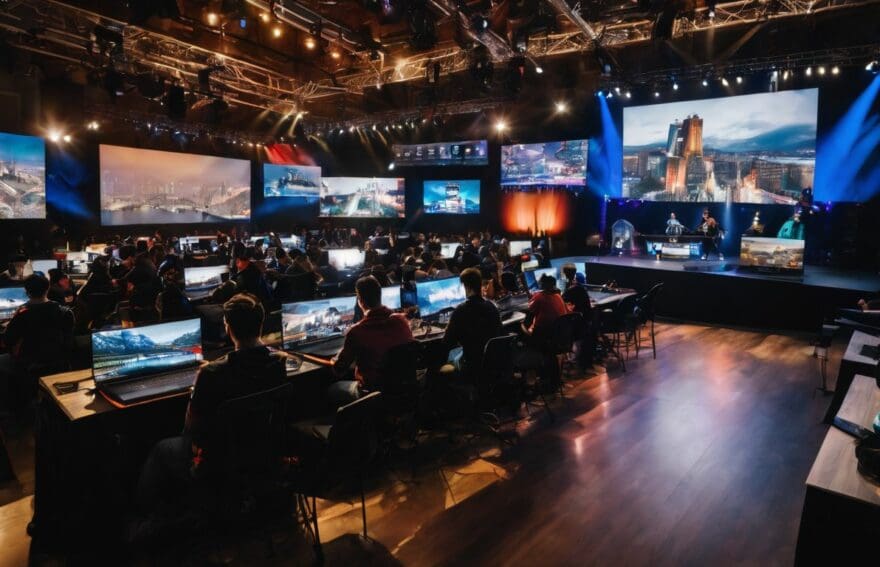The Role of Collegiate Esports in Shaping Professional Leagues

Updated On: March 14, 2024 by James Connolly
Are you intrigued by the impact collegiate esports have on the major leagues? We share your curiosity and have immersed ourselves in this enthralling world of digital competition. It’s a realm where sponsorships and broadcasting rights are no longer just for traditional sports, but also for academic institutions with a penchant for gaming glory.
Our forthcoming article will take you on a journey through the electrifying domain of varsity keyboards and mice—a place where education seamlessly blends with the spirit of contest.
Stay tuned—it promises to be quite the captivating read!
Key Takeaways
- Collegiate esports programmes are flourishing, with over 170 US universities offering varsity gaming teams and scholarships to talented players, creating a strong foundation for professional esports leagues.
- Partnerships between colleges and major companies like Twitch and Blizzard are vital, providing financial support that boosts the visibility and legitimacy of collegiate competitive gaming.
- Esports at the collegiate level act as a crucial talent pipeline for professional teams; students gain experience in structured environments which prepare them for careers as pro gamers.
- The growth of collegiate esports is challenging traditional notions of amateurism in college sports by opening discussions on player compensation and scholarship regulations.
- Investment in collegiate esports is attracting new fans and investors to the industry, showcasing its potential for substantial growth within both academic institutions and professional gaming circuits.
The Evolution of Collegiate Esports
Collegiate esports has seen a significant rise in popularity and support, with the establishment of varsity esports programs and leagues across universities. This growth has also paved the way for collegiate esports to become a feeder system for professional teams.
Definition of collegiate esports
Collegiate esports refers to organised competitive gaming among college and university students. We see a growing number of institutions embracing this digital sport, often with dedicated teams, coaches, and support staff similar to traditional athletic programs.
These teams compete in various video games at different levels of competition, ranging from local face-offs to national tournaments.
Since its inception in the late 2000s, collegiate esports has skyrocketed in popularity and professionalism. The National Association of Collegiate Esports (NACE) along with the Collegiate Starleague represent key players driving this surge forward.
They help lay down regulations and provide structure for intercollegiate competitions while offering our athletes valuable career opportunities within the burgeoning gaming industry.
Rise in popularity and support
Collegiate esports has experienced a rapid surge in popularity and support, with over 170 universities in the United States now offering varsity esports programmes. This rise is exemplified by major colleges like Ohio State University, which invests in dedicated gaming arenas and provides scholarships for competitive gamers.
Furthermore, the National Association of Collegiate Esports (NACE) boasts membership from more than 200 institutions nationwide, reinforcing the growing acceptance and integration of esports within academic settings.
Moreover, partnerships with industry giants such as Twitch and Blizzard Entertainment have fuelled this growth by providing significant financial backing to collegiate esports programmes.
Growth of collegiate esports leagues
Following the rise in popularity and support for collegiate esports, there has been a significant growth of collegiate esports leagues. With increased recognition from universities and colleges around the world, dedicated teams, coaches, and support staff have emerged to foster competitive gaming at an academic level.
The National Association of Collegiate Esports (NACE) and the Collegiate Starleague have seen a surge in membership as more schools embrace esports programmes. This growth reflects the mainstream acceptance of competitive gaming at the collegiate level, with revenues contributing to its professionalisation.
Esports partnerships have played a crucial role in shaping this growth. These collaborations have helped create opportunities for students to compete at a higher level while also providing a platform for their talent to be recognised by professional leagues.
The Impact on Professional Leagues
Collegiate esports serves as a feeder system for professional teams, providing a pool of talented and skilled players who have honed their craft at the collegiate level. Additionally, the rise in popularity of collegiate esports is shaping the landscape of professional leagues by attracting new fans and investors to the industry.
Feeder system for professional teams
Collegiate esports programmes have become a vital feeder system for professional teams, providing a platform for talented players to showcase their skills and advance to the next level.
With schools embracing esports programmes, students have access to coaching, training facilities, and support staff that help them develop their expertise in specific games. This structured environment not only nurtures talent but also prepares players for the rigours of professional competition.
Through collegiate tournaments and leagues, aspiring gamers gain valuable experience and exposure that can lead to opportunities within the professional esports scene.
The pipeline from collegiate esports to professional leagues has been further facilitated by partnerships with industry sponsors who recognise the potential in scouting emerging talents from these programmes.
Shaping the landscape of professional leagues
As a result, collegiate esports have significantly impacted the landscape of professional leagues. With institutions investing in dedicated programs and support staff, the pipeline for professional players and leagues has been shaped.
This not only elevates the talent pool for professional teams but also draws attention from fans and investors, paving the way for a new era in competitive gaming. The growth of collegiate esports has created opportunities for aspiring athletes to springboard into professional careers while influencing the mainstream acceptance of esports as a legitimate industry.
Furthermore, sponsors and partnerships play a pivotal role in supporting both collegiate and professional esports, contributing to their continuous growth and success in shaping the landscape of competitive gaming leagues.
Attracting new fans and investors
Collegiate esports have been successful in attracting new fans and investors to the gaming industry. The rise of collegiate gaming has sparked a cultural shift, drawing in both traditional sports enthusiasts and newcomers to the world of competitive gaming.
With significant revenue streams from sponsorships, licences, and ticket sales, collegiate esports have garnered attention from potential investors looking to capitalise on this rapidly growing market.
As collegiate programmes continue to professionalise and gain mainstream acceptance, they are poised to attract even more fans and investors eager to support the thriving industry.
The growth of collegiate esports has also served as a feeder system for professional leagues, offering a pipeline of talented players who capture the interest of fans and stakeholders alike.
This influx of fresh talent not only adds vibrancy to professional leagues but also contributes to their financial success through increased viewership, endorsements, and partnerships.
The Role of Collegiate Esports in NCAA Reform
Exploring the impact of collegiate esports on NCAA reform, including the ongoing debate about amateurism, potential regulations for collegiate esports, and how it may influence traditional college sports.
To learn more about the evolving landscape of collegiate esports and its role in shaping professional leagues, keep reading!
Amateurism debate
Collegiate esports has sparked a heated debate around the concept of amateurism. As universities embrace competitive gaming, questions arise about the status of student players and their eligibility for esports scholarships.
The traditional model of amateurism in college sports is being reevaluated to accommodate the unique nature of esports as a professional career pathway. This brings considerations for regulating collegiate esports in line with NCAA regulations, potentially impacting how student athletes are recruited and compensated within the gaming landscape.
Esports scholarships have become a key focus in this discussion, as they offer opportunities for students to pursue their passion for gaming while pursuing higher education. As universities navigate this new terrain, there is a growing need to balance academic commitments with the demands of competitive gaming.
Considerations for regulating collegiate esports
As we transition from the amateurism debate, it’s important to consider the considerations for regulating collegiate esports. With the rapid growth of collegiate esports, there is an increasing need for regulation to ensure fair play and a level competitive landscape.
Governing bodies such as NACE (National Association of Collegiate Esports) have been working towards establishing standards and guidelines for collegiate esports programs, including eligibility criteria, competition structure, and player welfare.
Universities are also faced with addressing the balance between academics and esports commitments. Regulating collegiate esports will play a crucial role in ensuring student-athletes’ academic success while pursuing their passion for competitive gaming.
Furthermore, as sponsors and partnerships continue to fuel revenue growth in collegiate esports, regulations must be established to maintain transparency and fairness in financial dealings within these programs.
Potential impact on traditional college sports
Collegiate esports is reshaping the landscape of traditional college sports as it competes for student participation and institutional resources. With the rise in popularity and investment in collegiate esports, there may be a growing shift in focus from traditional athletics to esports programs within colleges and universities.
This shift could potentially impact the recruitment of students for traditional sports teams, leading to changes in athletic scholarship allocations. Additionally, as colleges invest more resources into developing their esports programs, there might be an effect on the overall funding and support provided to conventional athletic departments.
The growth of collegiate esports has led to a reimagining of what it means to be a student-athlete and has prompted discussions about how traditional college sports can coexist with this emerging form of competition.
The Benefits and Challenges of Collegiate Esports
Collegiate esports offer students the opportunity to earn scholarships and pursue their passion for gaming while getting an education. However, challenges such as organisational and financial constraints, as well as balancing academics with esports commitments, are also prevalent in the collegiate esports landscape.
Scholarships and opportunities for students
Collegiate esports provides numerous scholarships and opportunities for students, encouraging their involvement in competitive gaming. Here are the benefits:
- Scholarships: Many colleges and universities offer scholarships to talented esports athletes, helping them pursue higher education while honing their gaming skills.
- Career Opportunities: Collegiate esports can open doors to a variety of careers in the gaming industry, such as game development, event management, and marketing.
- Networking: Students have the chance to connect with industry professionals and build valuable relationships through collegiate esports programs.
- Personal Growth: Participation in collegiate esports fosters teamwork, leadership, and strategic thinking skills that are applicable in both the gaming world and beyond.
- Exposure to Professional Scene: Through collegiate leagues, students gain exposure to professional teams and leagues, potentially leading to future career prospects within the professional gaming realm.
Organisational and financial challenges
- Securing funding and sponsorships to support teams, equipment, and travel expenses.
- Balancing the demands of esports training and competition with academic commitments.
- Developing effective organisational structures to manage teams, coaches, and support staff.
- Adapting to the rapidly evolving landscape of competitive gaming and technology.
- Navigating regulations and logistics for hosting tournaments and events on campus.
- Establishing sustainable revenue streams beyond initial investments in infrastructure and resources.
Balancing academics and esports
Balancing academics and esports requires careful time management and prioritisation of tasks. It is essential to strike a balance between maintaining good academic standing and excelling in esports. Here are some key considerations for balancing academics and esports:
- Time Management: Efficiently managing time for both academic studies and esports training is crucial. Creating a schedule that allows dedicated time for both pursuits can help maintain balance.
- Setting Priorities: Recognising the importance of education while pursuing esports is vital. Setting clear priorities can help in allocating appropriate time and effort to each area.
- Support Systems: Utilising available support systems, such as academic advisors, esports coaches, and mentorship programmes, can aid in navigating the demands of both academics and esports.
- Health and Well-being: Prioritising physical health through regular exercise, proper nutrition, and adequate rest is essential for maintaining overall well-being while juggling academic studies and esports commitments.
- Communication: Effective communication with professors, coaches, teammates, and peers about scheduling conflicts or academic responsibilities is crucial for managing expectations in both areas.
- Flexibility: Remaining flexible and adaptable to changes in schedules or unexpected academic demands can help navigate the challenges of balancing academics and esports effectively.
- Seeking Opportunities: Exploring opportunities for scholarships or educational support within the esports community can provide valuable resources for managing academic commitments alongside competitive gaming pursuits.
- Creating Boundaries: Establishing clear boundaries between academic work and esports training can help maintain focus on each pursuit without compromising performance in either area.
- Personal Organisation: Developing strong organisational skills to keep track of deadlines, assignments, tournaments, and practice schedules is essential for successful management of academics and esports.
- Developing Life Skills: Recognising that skills obtained through balancing academics with high-level gaming competition – such as time management, teamwork, decision-making under pressure – are transferable to various aspects of life beyond college.
Conclusion: The Future of Collegiate Esports and Professional Leagues
The future of collegiate esports and professional leagues is closely intertwined. Collegiate esports programs play an integral role in shaping the pipeline for aspiring pro players.
They provide a platform for talented individuals to showcase their skills and ultimately contribute to the growth and success of professional esports. As the support for collegiate esports continues to grow, it will undoubtedly influence the landscape of professional leagues, attracting new fans and investors along the way.
This symbiotic relationship between collegiate and professional gaming sets a promising trajectory for the future of esports as a whole.
FAQs
1. What role does collegiate esports play in shaping professional leagues?
Collegiate esports, governed by organisations like NACE (National Association of Collegiate Esports), plays a pivotal role in nurturing talent and regulating the transition from university competitions to professional gaming leagues.
2. How does student recruitment work for university esports programs?
Universities actively seek out talented gamers through student recruitment initiatives, offering scholarships and opportunities to compete at a collegiate level before potentially moving onto the big leagues.
3. Is there a cultural shift happening in gaming because of collegiate esports?
Yes, as more universities embrace esports, there’s a cultural shift with wider acceptance and recognition of competitive gaming as both an official sport and viable career path for students.
4. Does being part of a university esports team help students go pro?
Being on a university team can provide valuable experience, exposure to high-level competition, and networking opportunities that are crucial steps towards joining professional esports leagues.



